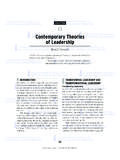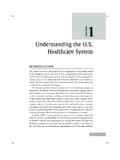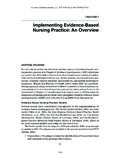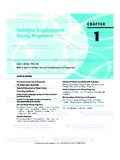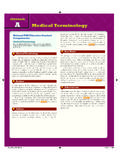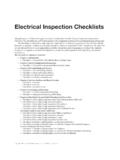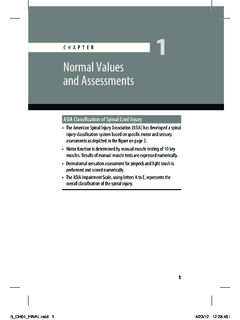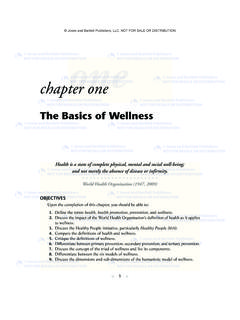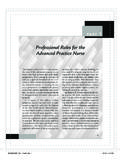Transcription of NOT FOR SALE OR DISTRIBUTION Chaper 25
1 Ethical issues have been known to cause distress among nurses, resulting in decreased job satisfaction and in-creased turnover intention (Hart, 2005). This is especially problematic when the ethical concern has some legal consequences. In some cases new laws have been created to provide guidance in response to ethical dilemmas. The two offer different ways of thinking about common problems related to rights of individuals with a disability within our society. For this reason we address both ethi-cal and legal issues in this chapter.
2 The intent is for the reader to appreciate the basis for ethical decision making and utilize resources that can provide guidance in deci-sion making. For more details on ethics and models of ethical decision making for nurses, please see texts on these specific and Legal IssuesRyan BratcherJames J. FarrellKathleen A. StevensKevin W. VandergroundLearning ObjectivesAt the end of this chapter, the reader will be able toUse the American Nurses Association Code of Ethics and Interpretive Statements as a guide for how nurses apply ethical concepts to decision making in rehabilitation.
3 Describe why guardianship is important and when it should be considered in rehabilitation. Recognize different types of advance directives and relevance in rehabilitation. Explain key protections within the Americans with Disabilities cOncept and termsAdvance directiveAmerican Nurses Association Code of EthicsAmericans with Disabilities Act (ADA)AutonomyBeneficenceBioethicsCapacit yDo not resuscitate (DNR)Guardian ad litemGuardianGuardianshipIndividuals with Disabilities ActInformed consentJusticeLiving willMedical power of attorneyNonmaleficencePatient Self-Determination ActPsychiatric advance directiveReasonable accommodationsVeracityChaper 25defining ethicsIn the course of daily life we make decisions as to the best or morally right action to take.
4 How we make decisions is based on our values and beliefs as well as laws or rules of society. Ethics is the branch of philosophy that deals with the values relating to human conduct and with respect to the rightness or wrongness of certain actions and to the goodness and badness of motives and ends of such actions. These values of human conduct are based on shared beliefs within a society or culture. Ethics most commonly refers to the reasons for decisions about how one should act based on the shared values and beliefs of the group.
5 Ethics refers not to a specific set of principles or rules but rather presents a way of guided 3862/24/11 9:12:35 AM Jones & Bartlett Learning, LLC. NOT FOR SALE OR DISTRIBUTION . Jones & Bartlett Learning, LLCNOT FOR SALE OR DISTRIBUTION Jones & Bartlett Learning, LLCNOT FOR SALE OR DISTRIBUTION Jones & Bartlett Learning, LLCNOT FOR SALE OR DISTRIBUTION Jones & Bartlett Learning, LLCNOT FOR SALE OR DISTRIBUTION Jones & Bartlett Learning, LLCNOT FOR SALE OR DISTRIBUTION Jones & Bartlett Learning, LLCNOT FOR SALE OR DISTRIBUTION Jones & Bartlett Learning, LLCNOT FOR SALE OR DISTRIBUTION Jones & Bartlett Learning, LLCNOT FOR SALE OR DISTRIBUTION Jones & Bartlett Learning.
6 LLCNOT FOR SALE OR DISTRIBUTION Jones & Bartlett Learning, LLCNOT FOR SALE OR DISTRIBUTION Jones & Bartlett Learning, LLCNOT FOR SALE OR DISTRIBUTION Jones & Bartlett Learning, LLCNOT FOR SALE OR DISTRIBUTION Jones & Bartlett Learning, LLCNOT FOR SALE OR DISTRIBUTION Jones & Bartlett Learning, LLCNOT FOR SALE OR DISTRIBUTION Jones & Bartlett Learning, LLCNOT FOR SALE OR DISTRIBUTION Jones & Bartlett Learning, LLCNOT FOR SALE OR DISTRIBUTION Jones & Bartlett Learning, LLCNOT FOR SALE OR DISTRIBUTION Jones & Bartlett Learning, LLCNOT FOR SALE OR DISTRIBUTION Jones & Bartlett Learning, LLCNOT FOR SALE OR DISTRIBUTION Jones & Bartlett Learning, LLCNOT FOR SALE OR DISTRIBUTION Professional Code of Conduct 387 In our society there are values outlined in the constitution that provide the foundation for our soci-ety.
7 The guiding principles of ethical decision making are autonomy, beneficence, justice, nonmaleficence and veracity (Masters-Farrell, 2007). autonomy is the duty to allow the individual the right to make his or her own decision. Conf licts arise when individuals or persons served make a decision that conf licts with that of the healthcare team, such as refusing treatment or pursu-ing a discharge plan the team believes is unsafe. The individual s decision may not be what the healthcare team prefers or recommends; however, the principle of autonomy says that professionals must respect the deci-sion made by the person served.
8 Decision making can be problematic when the individual is unable due to illness, functional level, cognition, language, or age to participate in the decision-making process, so a surrogate is used to execute decision making. This has been an important principle in several prominent court decisions and is discussed later in this value of human life and our responsibility as nurses to do good, promote health, and serve as a patient advocate should be the foundation for our second principle is beneficence, which is the duty to do good.
9 It frequently is paired with nonma-leficence, which is the duty to do no harm. So when presented with a choice of treatment options, the nurse is expected to elect to choose the option will do good and cause no harm. A conf lict arises when a treatment with a high likelihood for success comes with exceptional risk. Should a nurse recommend a patient take a medication that poses significant health hazards to affect a cure and yet could be potentially lethal for the person? In this case the conf lict for the nurse occurs in deciding between the potential for doing good and doing no principle of veracity refers to the duty to be truthful and provide the person served with adequate information necessary to make an informed decision.
10 This principle is the foundation for informed consent in patient care and research studies. In the case of the medication that is beneficial but carries significant risk, the importance of truth telling is key. The clinician would be expected to disclose the risks and benefits to the person in a manner that is understandable and in a language the person can understand. Upon disclosing full information, if the person freely elects to take the medication, then no moral or ethical issue results.
